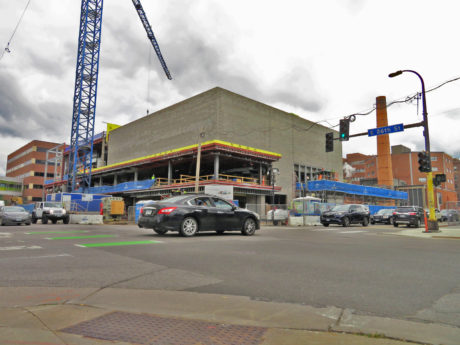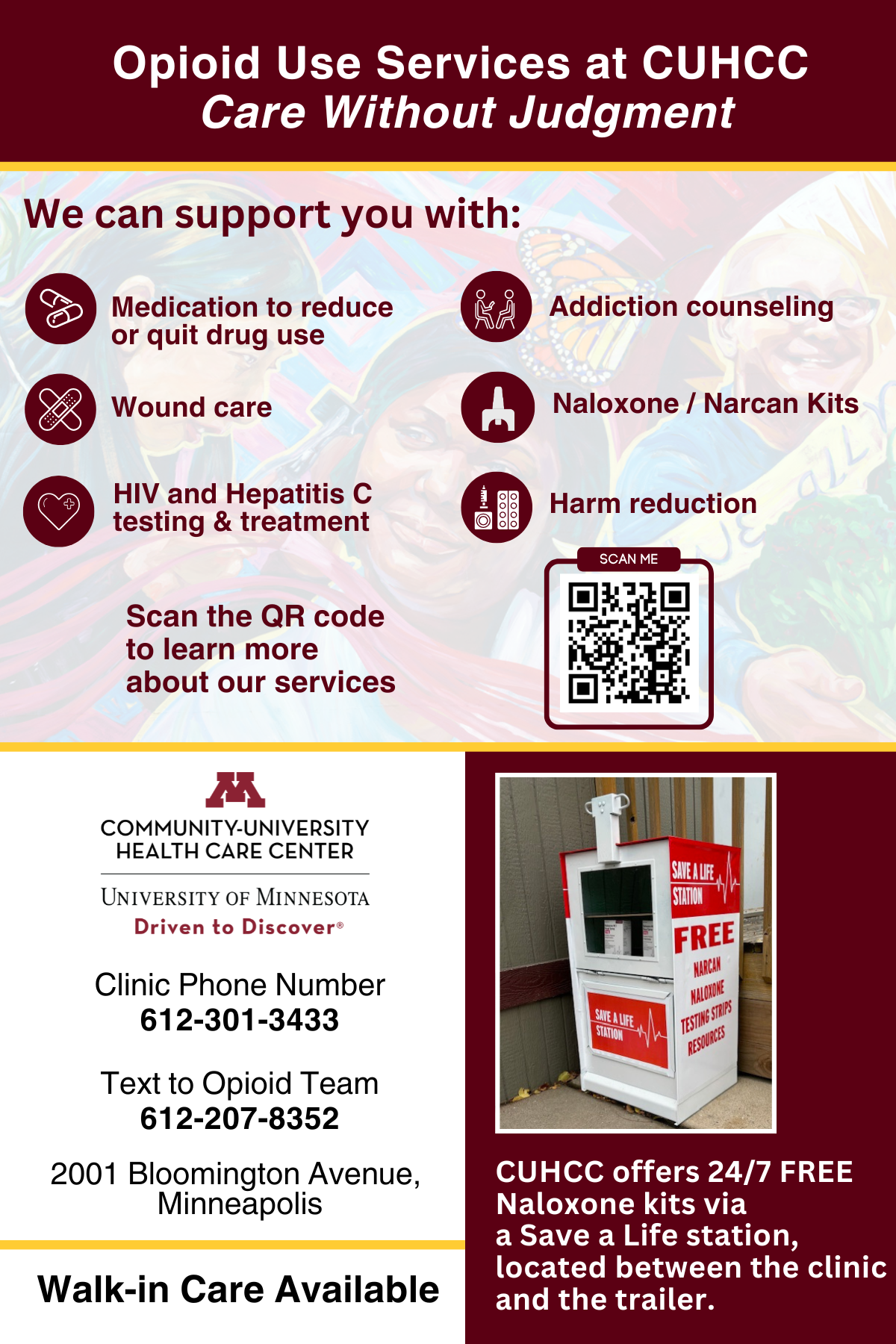Public Comment Period on Permit Opening this Fall

By LINDSEY FENNER
If you’ve driven on E 26th Street through Phillips this past summer, you’ve likely gone past the construction site at 26th and Chicago where Allina Health is building a new Central Utility Plant for Abbott Northwestern Hospital. Besides the traffic headache this has created, the bigger problem is that Allina has started construction on the utility plant before getting the final air emissions permit from the Minnesota Pollution Control Agency (MPCA).
Allina Health, which owns Abbott Northwestern Hospital and has their corporate headquarters in the Midtown building in Phillips, applied for the required amendment to their existing air permit in February 2021. In their application, Allina acknowledged the need for the final permit before construction on the new facility could begin. According to MN Rule 7005.0100 Subp. 3a, activities that should not be started before a permit is issued include “installing building supports and foundations, laying underground pipework, and constructing permanent storage structures.”
In an interview with MPCA air permit engineer Jeff Hedman, who has been working on the draft permit, said he had not been aware that Allina had started construction of the utility plant until it was brought to MPCA’s attention by the alley. They have referred the issue to their enforcement staff and would not comment further. According to Hedman, “Enforcement decisions are made on a case-by-case basis depending on the facts of the situation.” MN Rule 7005.0100 Subp. 3a states that permit applicants who begin construction “before obtaining any required permits do so at their own risk; a permit may not be issued or may not contain the terms the applicant desires.”
Allina Health responded to the alley’s request for comment with this statement:
“Allina Health has been diligently engaging with the MPCA on our Central Utility Plant since 2019. The current Central Utility Plant that supports the critical operations of Abbott Northwestern and Children’s hospitals is well beyond its expected life. Upgrading to a modern Central Utility Plant will ensure that we can continue to operate the hospital and deliver exceptional care to the community with more efficient and reliable equipment. Considering inflationary pressures and construction delays, Allina Health took prudent steps to advance construction on the Central Utility Plant building. At no time have we moved forward to operationalize the plant, without having the proper permit in hand. We share the MPCA’s commitment to the health of our community and look forward to concluding the air quality permitting process.”
Draft Air Emissions Permit in Process
The MPCA has been working on creating a draft air emissions permit with Allina for over a year and half. This process takes longer in the Phillips neighborhood. Because Phillips neighbors have struggled with the negative health impacts of a long history of environmental racism, Phillips has a specific state law–the Clark Berglin 2008 Environmental Justice Law– that attempts to protect our neighborhood from further environmental pollution. What this means practically, is that any air emissions permit application in Phillips needs to include some extensive information, data, and outreach that wouldn’t be required in other areas of the state. This includes more air pollutant modeling, a review of the cumulative effects of air pollution in the area, a public meeting (which doesn’t happen for most air permit applications), a longer public notice period, and more community outreach.
Facilities in MN need to get an air emission permit when their “potential to emit” certain pollutants are above a certain level as determined by state or federal guidelines. Some examples of “hazardous air pollutants” that have regulated emissions are: Particulate Matter (PM), which are tiny specks that can get into the lungs and bloodstream and damage the heart and lungs; sulfur dioxide (SO2) which can impair breathing and create acid rain; and Volatile Organic Compounds (VOC) which can contribute to forming ozone or smog.
According to their permit application, ANW will be removing some smaller boilers, and replacing them with fewer, larger natural gas boilers. They will also be replacing the diesel engines that run their emergency generators with larger units, and installing a new turbine which will help with efficiency of their steam generator.
The new equipment Allina plans to install is bigger than the old equipment, which means more air emissions, potentially doubling some pollutants. The original permit application asked for an increase of the previous permitted emission levels of 1.8 times for PM 2.5; 2 times for sulfur dioxide (SO2); and 2.2 times for Volatile Organic Compounds (VOC). PM2.5 is the common air pollutant associated with the most negative health impacts of air pollution. Because of this significant increase and concerns raised by community members, the MPCA has been working with Allina to lower those numbers.
Why should you care?
Emissions from fossil fuel burning boilers and generators can cause serious damage to your health and the environment. In a 2022 joint report, Life and Breath, the MPCA and the Minnesota Department of Health found that in the Twin Cities metro, “air pollution played a role in 10% of all deaths (about 1,600 people) along with nearly 500 hospitalizations and emergency room visits for heart and lung problems” and found that “pollution-related deaths were more prevalent than deaths from accidents.” The report also found that low-income communities of color were more likely to be affected by the negative health impacts of air pollution: “ZIP codes with the largest percentage of residents of color had more than five times the rate of asthma emergency room visits related to air pollution compared to areas with more white residents.”
And although it’s easy to see that facilities like iron foundries and trash burners would all increase the pollution burden of a community, hospitals and the healthcare industry that might treat your pollution-related health conditions are significant air polluters themselves. A 2016 study estimated that the healthcare industry as a whole contributed 10% of all US greenhouse gas emissions, with proportionate impacts on acidification, smog formation, and respiratory disease from particulate matter. Because of the damage to both public and environmental health, in June 2022, the Biden-Harris Administration has called on the healthcare industry to sign a pledge to reduce greenhouse gas emissions 50% by 2030. Abbott Northwestern is the third largest hospital in MN by licensed beds, and according to a 2022 Minneapolis St. Paul Business Journal survey, Allina Health is the second largest employer in the state. As of August 17, Allina has not signed onto the pledge to reduce greenhouse gas emissions.
This is not the first time Abbott Northwestern has put the health of Phillips neighbors at risk with their air emissions. In the 1980s, Abbott Northwestern installed an incinerator to dispose of hospital waste which was extremely toxic because of the high percentage of plastics burned. At the time, hospital incinerator emissions were not regulated. According to the January 1990 issue of the alley, the incinerator was finally shut down because of community outcry and when the Minneapolis Pollution Control Division ordered the hospital to perform emissions testing.
Ways for Feedback:
This fall, the Minnesota Pollution Control Agency (MPCA) will be opening a public comment period for the amended air permit for the new Central Utility Plant at Abbott Northwestern Hospital. Neighbors will have a 45-day window to submit written comments. A public meeting will also be held during that time. Check the project website and sign up for email updates: https://www.pca.state.mn.us/air/abbott-northwestern-hospital-central-utility-plant-project
MPCA Concerns or Complaints: Call the MPCA if you have concerns about local air pollution/quality, water runoff, or hazardous waste: 651-296-6300 Or submit an online complaint: https://www.pca.state.mn.us/about-mpca/submit-complaint
Visit https://www.pca.state.mn.us/air for lots of information about air quality in Minnesota
Learn more about the unique air permitting process in South Minneapolis: https://www.pca.state.mn.us/air/air-permitting-south-minneapolis









